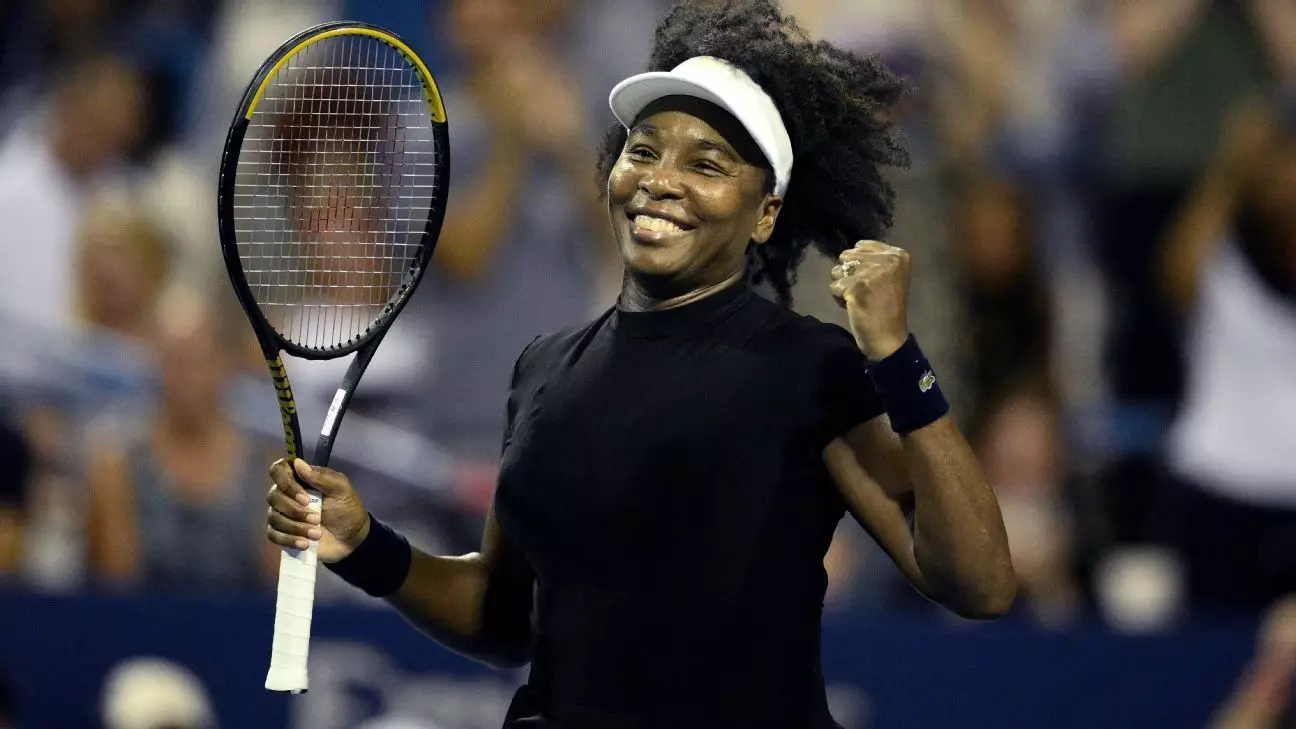In a sport often obsessed with youth and fleeting brilliance, Venus Williams’s comeback at the age of 45 is nothing short of inspirational. Her recent victory at the DC Open is a testament to an unyielding spirit that refuses to bow to physical limitations or the passage of time. More than just a win, her performance sent a clear message: resilience, determination, and passion can defy conventional expectations. Williams’s journey underscores a profound truth—true strength lies in the relentless pursuit of one’s passion against all odds.
What makes Williams’s return so remarkable isn’t solely her victory but the context surrounding it. After undergoing surgery for uterine fibroids and spending significant time away from the singles circuit, her physicality was naturally in question. Yet, what stood out more was her mental fortitude. She openly admitted that the weeks of training oscillated between doubt and hope, illustrating the mental battle that often accompanies physical setbacks. Her ability to maintain focus, push through self-doubt, and eventually claim a win is a masterclass in perseverance, elevating her beyond a mere athlete to a symbol of courage.
The significance of this win transcends personal accomplishment. It challenges society’s narrative about aging, especially in high-performance sports where youth is often heralded as the ultimate currency. Williams, by competing and winning at her age, serves as a beacon that one’s prime isn’t solely dictated by years but by relentless effort and mental grit. Her victory isn’t just a statistical milestone; it’s a powerful statement about human potential, regardless of age.
Performance and Humanity: A Glimpse Behind the Curtain
Watching Venus Williams in her recent match reveals the delicate balance between mastery and vulnerability. Her game still bears the hallmarks of her legendary career—blistering serves clocking at speeds reminiscent of her prime and groundstrokes that cut through the court with precision. Yet, she also exhibited hesitant moments—missed shots, missed opportunities to close out the match—reminding us that even the most accomplished athletes are fallible.
This blend of strength and imperfection humanizes Williams, transforming her from an invincible icon into a relatable figure who struggles, persists, and triumphs. Her open acknowledgment of the mental struggles—fighting self-doubt week after week—demonstrates extraordinary self-awareness. It also underscores that resilience isn’t an innate trait but a conscious choice, often accompanied by doubts and fears. Her emotional display, from wide smiles to fists raised, communicates a raw, genuine sentiment: success isn’t solely about results but about overcoming internal battles.
Williams’s focus on health remains a critical element of her comeback. In an era where injuries and health concerns frequently prematurely end athletes’ careers, her emphasis on good health as a prerequisite for competition redefines the narrative. Her desire to compete at a high level without compromising her well-being is a testament to maturity and a unique understanding of longevity. It is this commitment to holistic wellness—not just performance—that enhances her story’s inspiring qualities.
Breaking Boundaries: Challenging Ageism and Sport’s Limits
Venus Williams’s success at this stage of her life is a provocative challenge to the sports world’s fixation on youth. She is more than just a contender; she is a reclamation of grace, strength, and professionalism in an age where many peers have long since retired or faded from the spotlight. Her appearance at the DC Open, drawing enthusiastic applause and heartfelt support, reflects a cultural shift toward appreciating sustained excellence rather than fleeting moments.
The historical context adds further weight. Martina Navratilova, at 47, remains the only older woman to achieve a tour-level singles win, emphasizing the rarity and difficulty of such feats. Williams’s victory at 45 not only bridges that gap but also rewrites the narrative for future generations of athletes, especially women who often face added societal pressures around aging and performance. Her emergence as a winner at this stage of life ignites hope for countless fans and aspiring players that passion and perseverance can extend the competitive lifespan dramatically.
Her journey also prompts reflection on the importance of resilience beyond trophies. It signals an internal victory, a message of hope that challenges, setbacks, and aging need not define the end but can become catalysts for a powerful resurgence. For many, Williams is a living proof that dedication, a positive mindset, and health consciousness can produce extraordinary outcomes, regardless of societal expectations linked to age.
Beyond Tennis: A Source of Inspiration
Venus Williams’s return resonates far beyond the courts. It champions a broader message—persistence in pursuit of goals amid adversity can inspire not only athletes but anyone facing their own hurdles. Her story encourages embracing the vulnerability that comes with age and setbacks, viewing them not as obstacles but as opportunities for growth.
Moreover, her acknowledgment of the mental challenges—feeling doubt and hope in equal measure—normalizes the internal struggles that everyone encounters on the path to achievement. It demystifies greatness, making it accessible and inspiring to those who might feel discouraged or sidelined. Her win is a celebration of human resilience, power, and passion—a reminder that success isn’t reserved solely for the young, but for those who refuse to give up.
Williams’s ongoing quest to compete at her highest level also sparks a vital conversation: sport is as much about the mental journey as the physical. Her unwavering desire to compete, despite the hurdles, embodies a mindset that many can emulate—facing fears, embracing imperfections, and persevering through doubt. Her story challenges societal notions of aging, proving that with the right attitude, the spirit of competition can genuinely transcend age.

